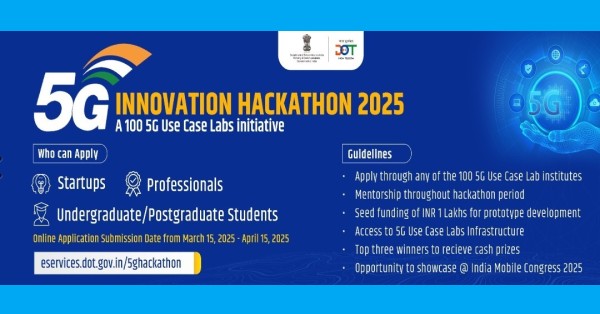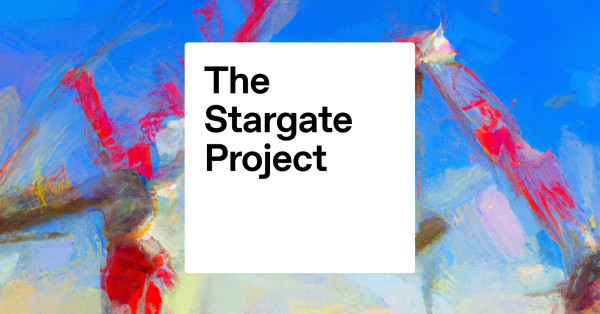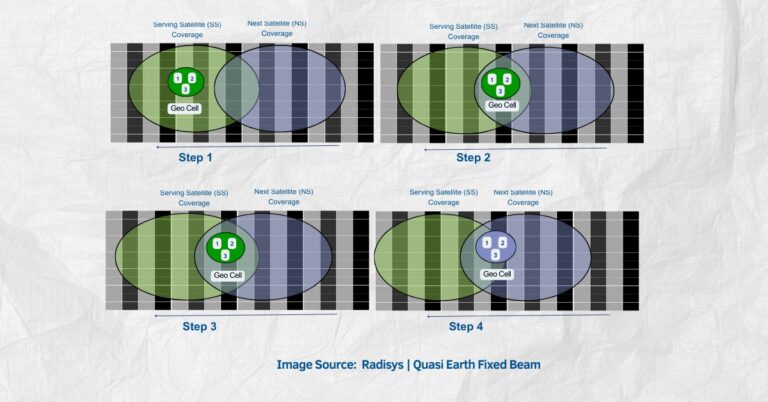The Department of Telecommunications (DoT) has officially announced the 5G Innovation Hackathon 2025, a six-month-long competition designed to accelerate the development of 5G-powered solutions. This initiative will foster technological advancements across industries while addressing societal and industrial challenges through next-gen connectivity solutions.
Fueling India’s 5G Growth Through Innovation
As India rapidly expands its 5G infrastructure, initiatives like the 5G Innovation Hackathon 2025 play a crucial role in driving digital transformation. With increased 5G adoption in sectors like healthcare, manufacturing, and smart cities, the country is poised to become a global leader in 5G-driven applications. The hackathon will provide funding, mentorship, and access to 100+ 5G Use Case Labs, helping participants turn innovative ideas into real-world solutions.
Who Can Participate?
The hackathon is open to students, startups, and industry professionals. Participants will work on cutting-edge 5G applications, benefiting from direct collaboration with experts in academia, industry, and government.
Key 5G Use Cases in Focus
The hackathon will explore several high-impact 5G applications, including:
- AI-powered network automation for better efficiency and reduced downtime
- IoT-based solutions for smart cities, healthcare, and industry 4.0
- 5G broadcasting and Direct-to-Mobile (D2M) communication
- Smart healthcare innovations like remote surgeries and AI diagnostics
- Agriculture and AgTech applications for precision farming and smart irrigation
- Industrial automation with connected robotics and real-time data analysis
- Non-Terrestrial Networks (NTN) for expanded rural and remote connectivity
- V2X (Vehicle-to-Everything) technology for connected and autonomous mobility
- Quantum communication to enhance network security
Hackathon Structure: Three Key Phases
The competition will unfold in three stages:
1. Proposal Submission (March 15 – April 15, 2025)
Participants will submit detailed proposals, outlining their 5G-powered ideas. Institutions can recommend up to five entries, which will be evaluated by regional committees.
2. Regional Shortlisting & Prototype Development
Around 150-200 teams will be selected to refine their concepts. The top 25-50 teams will each receive ₹1,00,000 in seed funding to develop prototypes over three months. Participants will gain:
- Access to 5G labs
- Mentorship from industry and academic leaders
- Support for IPR (Intellectual Property Rights) filing
3. Evaluation & Final Showcase (September 2025)
Teams will present their prototypes to a panel of experts from government, academia, and industry. Solutions will be evaluated on:
- Technical feasibility
- Scalability potential
- Industry and societal impact
- Innovation and novelty
Exciting Rewards & Recognition
The top winners will receive significant financial incentives:
- Winner: ₹5,00,000
- First Runner-up: ₹3,00,000
- Second Runner-up: ₹1,50,000
- Best Idea & Most Innovative Prototype: ₹50,000 each
- 10 Labs will receive Certificates of Appreciation for the Best 5G Use Case
- One Emerging Institute will be recognized for the Best Idea
Winners to be Showcased at India Mobile Congress 2025
The final winners will be announced on October 1, 2025. Top teams will present their innovations at India Mobile Congress (IMC) 2025, India’s largest telecom and technology event.
India’s 5G Roadmap: Why This Hackathon Matters
How 5G is Transforming Key Sectors
The hackathon will drive innovation in multiple industries:
- Healthcare: Enabling remote surgeries, AI diagnostics, and telemedicine advancements
- Manufacturing: Supporting smart factories and real-time automation
- Agriculture: Enhancing precision farming and real-time crop monitoring
- Transportation: Enabling connected vehicles, autonomous driving, and smart logistics
- Telecom: Optimizing network performance using AI and network slicing
A Global Perspective on 5G Innovation Challenges
Countries like the US, China, and South Korea are already leveraging 5G-driven solutions to enhance connectivity, automate industries, and enable smart city initiatives. India’s 5G Innovation Hackathon 2025 aligns with these global trends, positioning the country as a leader in 5G technology adoption.
Government Support & Vision for 5G Innovation
The initiative is backed by a ₹1.5 crore budget, with the goal of:
- Developing 50+ scalable 5G prototypes
- Generating over 25 patents
- Strengthening academia-industry-government collaboration
- Boosting the startup ecosystem focused on 5G innovation
By leveraging 5G advancements like network slicing, Quality of Service (QoS), and ultra-reliable low-latency communications (URLLC), the hackathon will pave the way for India’s next-generation connectivity solutions.
Final Thoughts
The 5G Innovation Hackathon 2025 is a significant step toward India’s digital future. By nurturing young talent, fostering collaboration, and supporting scalable innovations, this initiative will play a key role in shaping India’s 5G-driven technological landscape. Participants will have the opportunity to turn ideas into reality, contribute to India’s 5G ecosystem, and showcase their innovations on a global stage.




























